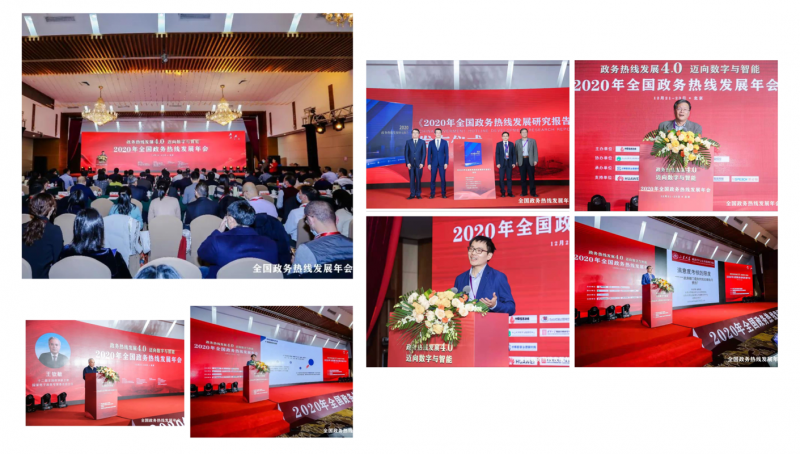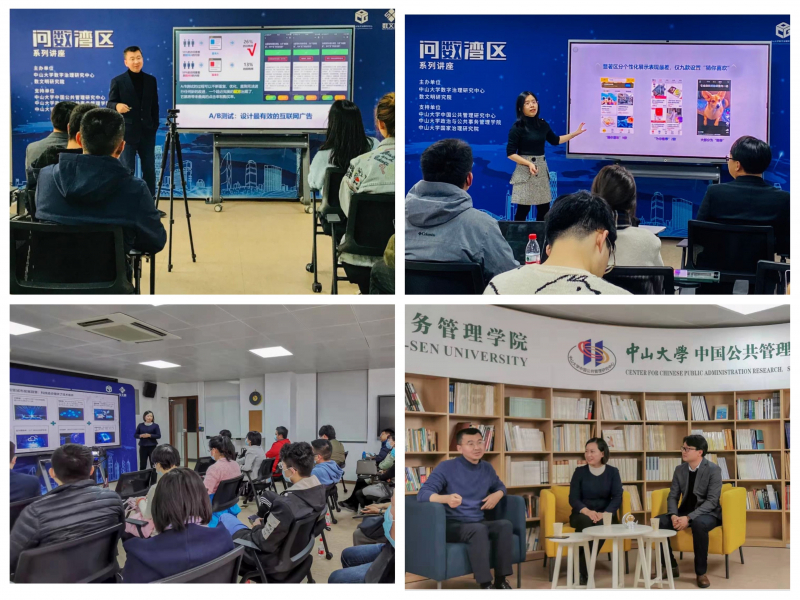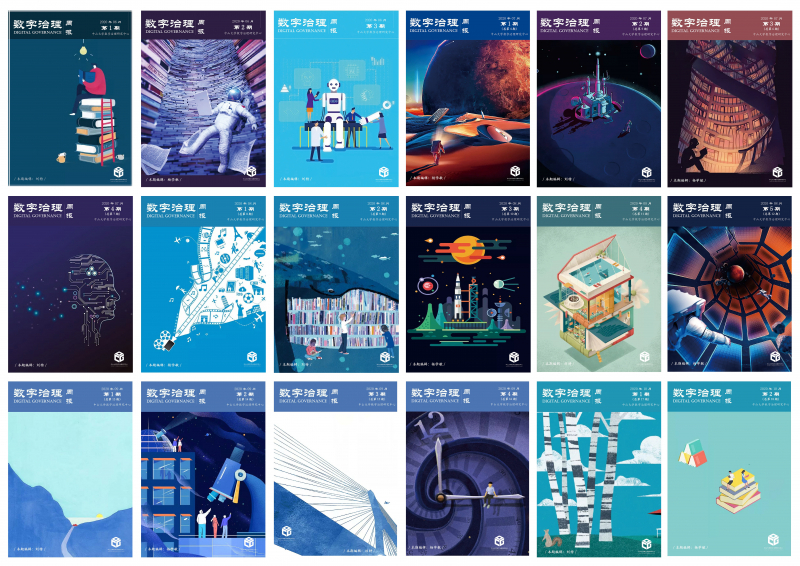Review of Academic Activities of the Center for Digital Governance of SYSU in 2020
The Center for Digital Governance of Sun Yat-sen University (SYSU) is a research institution jointly established by the Center for Chinese Public Administration Research (CCPAR), the School of Government, and the Institute of State Governance (ISG) of SYSU. Since the establishment of this entity in 2018, the Center has been focused upon studying the impacts and changes brought by new technologies such as mobile Internet, big data, and cloud computing to government operations and public governance. This is done so as to track the pulse of the digital era and respond to the concerns of the present day. At the same time, it has created an academic exchange platform for research on digital governance by organizing or co-organizing academic activities related to public governance research.
In 2020, in cooperation with the China Information Industry Association (CIIA), the Government Hotline Development Union (GHDU), the Center on Data and Governance of Tsinghua University (CDG), and the Caibo Intelligent Governance Research Institute (CIGRI), the Center continued to organize lectures series and forums and publish research reports on the “Transformation and Development of the Government Hotline” in an effort to explore the possible ways to enhance the government hotline service capacity and foster better and more intelligent data governance. At the same time, it jointly established the “Shunde Government Data Application Lab” with the Shunde District Government Affairs Data Administration, aiming to optimize the management and application of government data, so that digital government can play a better role in the modernization of the government’s administrative system. Furthermore, it has launched series of activities on “Stories of Big Data in China’s Greater Bay Area” with Data Civilization S&T and the Southern Metropolis Daily, aiming to promote the exchange and development of digital government and digital governance in the Greater Bay Area. In terms of student training, by publishing the Digital Governance Weekly and organizing “Mutual Learning Workshops” on a regular basis, the Center encouraged students to read literature, learn research methods, and participate in writing academic papers and research reports in order to improve their research capabilities.
Ⅰ. Lectures Series, Forums and Reports on the “Transformation and Development of the Government Hotline”
The Center hosted a series of ten online lectures together with the GHDU and the CIGRI. It also jointly organized the “Second Session of the National Government Affairs Hotline Development Summit Forum” and the “2020 National Government Affairs Hotline Development Annual Conference” with the CIIA, the GHDU, and the CIGRI. Nearly 600 experts and academics from different universities and representatives of government hotlines across China participated offline and nearly 100,000 people participated online during these events so as to discuss the development of the government hotline, in particular, how to improve the management and services of the government hotline and promote the transformation of the government hotline in the era of big data and artificial intelligence.
1. Ten Serial Lectures with 20,000 Online Participants
Ten serial lectures on the “Transformation and Development of the Government Hotline” were held via live streaming from April until June 2020, where Zheng Yueping, an associate professor at the School of Government, and Shen Bo, head of Guangzhou Government Service Hotline Center and deputy general manager of Best Tone Information Service Center of China Telecom Guangzhou Branch, were invited as guest speakers. They shared their thoughts on various themes during the lectures and explored the transformation and upgrading of the government hotline in the era of big data and artificial intelligence before interacting with online participants. The themes of the ten lectures include: “The Changed and the Unchanged of the Government Hotline during the Past Thirty Years”, “Towards Data Governance: Bringing the Government Hotline Data into Play”, “Intelligent Construction: An Inevitable Choice for the Transformation of the Government Hotline”, “Comparing with the World: How Far are We from the World’s First-Class Government Hotlines”, “Constructing Social Value: A New Dimension of Understanding Government Hotline Services”, “Similarities and Differences Between Call Centers and Government Hotlines”, “The Three-Stage Theory: A Theoretical Exploration of Top-Level Design of the Government Hotline”, “Exploring the Organizational Structure of the Government Hotline under the Framework of the Three-Stage Theory”, “Reflections on the Data Governance Model of Government Hotlines under the Framework of the Three-Stage Theory”, “Ideas and Practices of the Intelligent Construction of the Government Hotline”.

2. The Second Session of the National Government Affairs Hotline Development Summit Forum and the Press Conference of the 2020 China Government Hotline Service Quality Evaluation Report with 300 Offline Participants and 25,000 Online Viewers
On July 23, 2020, the “National Government Affairs Hotline Development Summit Forum and the Press Conference of the 2020 China Government Hotline Service Quality Evaluation Report” was held in Weifang, Shandong Province. Wang Qinmin, vice chairman of the 12th CPPCC National Committee and director of the National Expert Committee on E-Government, extended his congratulations on the opening of the forum and made a guiding speech by video link. Tian Qingying, deputy Party secretary and mayor of Weifang, Zhu Yu, vice president and secretary-general of CIIA, and Prof. Tan Ankui, dean of the School of Government and director of CCPAR, delivered speeches at the opening ceremony as well. Associate professor Zheng Yueping released and interpreted the 2020 China Government Hotline Service Quality Evaluation Report. Experts and scholars from Tsinghua University, Renmin University of China, Shandong University, and other universities had a discussion with representatives of government hotlines across the country on topics concerning practical innovation, technology application, data governance, and intelligent construction of government hotlines.

3. The 2020 National Government Affairs Hotline Development Annual Conference and the Releasing of the 2020 China Government Hotline Development Research Report with 300 Offline Participants and 53,000 Online Viewers
The 2020 National Government Affairs Hotline Development Annual Conference was held in Beijing on December 22, 2020. More than 300 people attended the conference, including experts such as Wang Qinmin, Zhu Yu, Prof. Tan Ankui, Prof. Zhang Xiaojin, vice chair of Tsinghua Institute for Governance Studies and director of the Department of Political Science, leaders from the Office of Transparency in Government Affairs, and the Office of Transforming Government Functions under the General Office of the State Council, leaders in charge of local government hotlines, news media and representatives of government hotlines all across the country. During the conference, the China Government Hotline Development Research Report was jointly released by relevant leaders and representatives and interpreted by associate professor Zheng Yueping. The forum did not only meet the current need to develop government hotline, but also satisfied the joint desire of government hotlines at all levels across the country to pursue common development. This provided an important platform to summarize and exchange the experience in the development of government hotlines across the country, thus facilitating the construction of a service-oriented government, and one that is able to satisfy the needs of the people.

Ⅱ. Jointly Launching and Organizing a Lecture Series on the “Stories of Big Data in China’s Greater Bay Area”
The Center worked in tandem with Data Civilization S&T and the Southern Metropolis Daily in order to launch the lecture series on “Stories of Big Data in China’s Greater Bay Area”, with a goal to promote the exchanges between practitioners and researchers, track new development of digital governance, and explore the path and direction of innovating and improving digital governance in the Bay Area. Now three sessions of the lecture series have been held, where Tu Zipei, CEO of Data Civilization S&T and deputy to the 15th Guangzhou municipal people's congress, Li Ling, journalist of the Southern Metropolis Daily and researcher of Nandu Personal Information Protection Research Center (PIPRC), and Wang Xiaojie, doctor of management and head of the Baiyun District Government Affairs Data Administration, were invited as guest speakers to respectively share their thoughts on the following three topics: “Progress and Alienation in the Era of Artificial Intelligence”, “Observation of Personal Information Protection on the Internet”, and “Logic of Building a Smart City: Data Empowerment and Urban Governance”. During the round-table discussion, the guests and the participants discussed and exchanged their views on the topics shared.

Ⅲ. Jointly Establishing the “Shunde Government Data Application Lab”
Promoting the construction of digital government is a crucial strategy formulated by the Party and the central government. The Fourth Plenary Session of the 19th CPC Central Committee clearly proposed to promote the construction of digital government and the orderly sharing of data. Big data, cloud computing, artificial intelligence, and other new generation information technologies should not only be used to boost the innovation of means, modes and concepts of governance, but also enhance the capacity of digital services, supervision and governance, promote industrial transformation and upgrading, and facilitate social governance. The construction of digital government does not only underpin the construction of a digital realm within China and the achievement of high-quality economic development, but also points the way forward for the modernization of China’s governance system and governance capacity.
In this context, the Center, the CCPAR, and the Shunde Government Affairs Data Administration jointly established the “Shunde Government Data Application Lab” on September 3, 2020, with the goal to optimize the management and application of government data, so that digital government can make its requisite contribution to the modernization of China’s governance system. Prof. Tan Ankui, Wang Qiushi, executive deputy director of the CCPAR and associate professor at the School of Government, Prof. Huang Dongya, Prof. Liu Yaping, associate professors Luo Siqi and Zheng Yueping at the School of Government, Cai Wei, deputy head of Shunde District, Du Qimin, deputy director of Foshan Municipal Government Affairs Data Administration, Lin Qingyao, director of Shunde District Government Affairs Data Administration, deputy directors Ji Yaofeng and Hai Yubao and many other experts and leaders attended the inauguration ceremony and the symposium on the construction of digital government.

Ⅳ. Creating“Mutual Learning Workshops”and Digital Governance Weekly
In order to encourage students to read both classical and the most recent literature, follow the innovative trends in practice, and master research methods in a systematic manner, the Center has launched the “Mutual Learning Workshops” and the Digital Governance Weekly to create a platform for study, research, and exchange. So far the year 2020 has seen 14 “Mutual Learning Workshops” and 35 issues of Digital Governance Weekly. Students have extensively participated in writing research reports and academic papers, many of whom have published academic papers in Chinese and English journals and have gained admission to Tsinghua University, Renmin University of China, Zhejiang University, Shanghai Jiao Tong University and other universities to continue their studies.

The academic activities organized by the Center in 2020 were active explorations with strong support from the CCPAR, the School of Government, and the ISG. In 2021, the Center will continue to carry out assorted forms of academic activities with partner institutions and further focus on themes such as the “Transformation and Development of the Government Hotline”, “Mobile Government Innovation”, “Construction of Data Governance Systems”, and “Coping with Digital Risks”, thus continuing to promote the application of mobile Internet, big data, and artificial intelligence technologies in the realm of research and in the practice of public governance.





